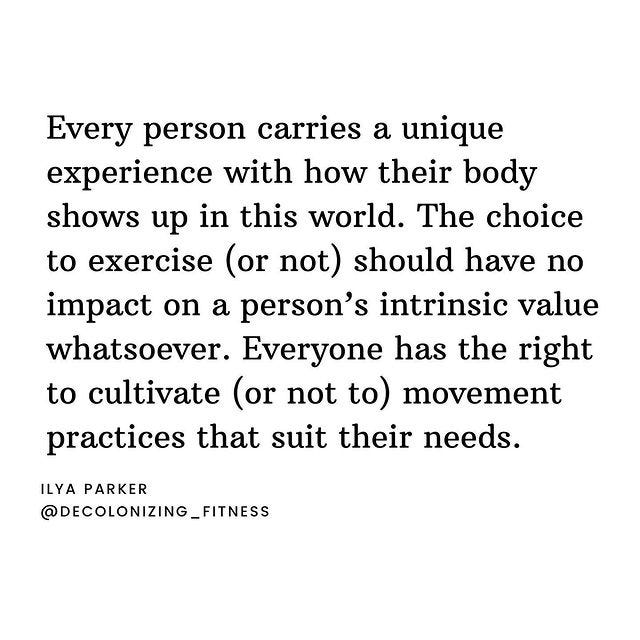Quick housekeeping note: We would still love you to fill out this form to help us plan for the Fat Talk book tour and launch. Thank you!
Every year, I get a little anxious when the leaves drop and we turn the clocks back. It isn’t exactly seasonal affective disorder, but there is that unmistakable frisson of dread about how cold, how dark, how long till I’m warm again. Every fall, Dan and I have some version of the same conversation where he talks me through how November and December go so fast because it’s the holidays, and then January is when you don’t mind a little real winter, February is a short month anyway, and then it’s March, which yes, lasts forever, has terrible weather and you just have to get through but then, it’s April and we’re back, sort of (really mid-May where we live but okay).
What he’s really doing, in this conversation, is reminding me it won’t always be like this. The reason I get anxious about the dead of winter is because on some level, I feel like dark and cold is our true state. The magic warm-up of spring, the long days of summer, the glory of fall—if you live in the Northeast, it can all feel like playing pretend. We live in the woods, on a small mountain in New York’s Hudson Valley. It is magical here when the trees have leaves. But our trees lose their leaves sooner and get them later than even our neighbors down the road at a slightly lower elevation. Now it is stick season, for months. And some deeply pessimistic part of me looks around at all the gray, bare branches and thinks, well, yes. This is who we are when we’re at home.
The twist for this particular stick season is that it has coincided with a season of exercise for me. This year has not been huge on the exercise front. Back in January, I threw out my back, sprained my ankle, and got Covid all more or less simultaneously. I’ve been going to physical therapy twice a week ever since. For a while I couldn’t do any other exercise because I couldn’t do any other exercise (I could barely do my PT exercises). Then I had book deadlines. Then it was garden season, and I will always choose garden puttering over anything diet culture would define as exercise but also even over other forms of movement I legitimately enjoy, like walking and yoga.1
But in the last month or so, some stars have aligned: My schedule is a little more open right now in these months of calm before the book launch. My ankle has healed. My back is significantly stronger thanks to finally figuring out a detente with core work. And so I’m down to once a week PT, I’m taking more walks in our woods with my dog and I’ve gotten into Lauren Leavell’s blessedly diet-talk-free barre workouts.
And yet. I realized the other day, tromping through the leafless woods, that this nascent little exercise routine feels like another version of playing pretend. That I always believe, on some level, that I am not meant to be a body in motion. That my true state is Someone Who Does Not Exercise, who is inert, just like those dead of winter trees.
I want to be clear that I do not believe that People Who Exercise are morally superior to People Who Don’t Exercise. This is why I chafe at workout selfies; at diet culture’s preoccupation with performing fitness as a way to reinforce our hierarchy of good and bad bodies. You don’t need to workout to have a good body. That’s a myth rooted deep in ableism, healthism, and privilege of many kinds. But there’s another piece of this conversation worth exploring: Who gets to claim the label of Person Who Exercises? And what receipts do they need to show?
Some of this, yes, is down to personal preference. I am not, nor have I ever been, someone naturally drawn to sports or sweating. My greatest physical pleasures are eating delicious meals and lying down somewhere beautiful, or at least comfy, reading a novel (preferably with a delicious snack). As Corinne said recently, laying on the couch is the best. I am married to someone who would choose, without any diet culture agenda, to go for a long run or a grueling hike over reading for pleasure even though he also likes that, and the way we are just wired so differently here will forever be a mystery to both of us.

But there is also, absolutely, a degree of privilege here. Dan maintains his sense of himself as an endurance athlete even when he goes long stretches without running or hiking and logs 100 hours on a video game instead. So do many of my friends who regularly get up at 5am to fit in a run or a long bike ride, or hit the gym after work, or always go to the same Sunday morning yoga class—but, also, maybe just as regularly, don’t do those things for a while. Because the demands of life —work, kids, holidays, random injuries— get in the way for them just like they do for me. And they may feel grumpy about not working out for a whole variety of reasons. They may start to struggle with their body image, because we live in a culture that tells all of us to value ourselves more if we exercise. But they don’t feel like they have now been outed to the world as People Who Don’t Exercise. And that’s because they are thin.
When you are thin, it is much, much easier to get away with not working out. Doctors won’t lecture you about it. In fact, they probably assume you’re doing more than you maybe are. If you are a Thin Person Who Does Not Exercise, friends and family will just envy your ability to be thin without it, rather than blaming your lack of exercise for your body size. And whatever your true status as an exerciser, it is assumed that you are healthy; that you can move your body with ease and confidence; that any perceived shortcomings —tight hamstrings, say—are because you must run so much, not because the shape of your body is a problem. It doesn’t matter if you are actually running so much. If you once ran, you will run again. You are a Runner. And if you can’t run, you’ll cycle or go to cardio barre. You are a Person Who Exercises.
But a fat person can never exercise enough. Spend anytime in the comments on posts by Ragen Chastain, Meg Boggs, Jessamyn Stanley, Roz the Diva, Mirna Valerio, Jordan Underwood, and you’ll see how we are judged, prescribed to, and gaslit. The world’s assumption (and especially the fitness industry’s assumption) is that our workouts aren’t hard enough; our commitment isn’t as ironclad; our injuries are excuses. We are not People Who Exercise because we aren’t thin. The best we can do is be a Good Fatty. But that means constantly defying odds. That means no rest days. That means leaning into the spectacle of being a fat person who is surprisingly good at exercise, rather than just being in whatever relationship you want to be in with exercise.
Fitness culture has taught us that the primary purpose of exercise —underneath “reduce stress” and “sleep better” and all those other nice-to-haves—is achieving and maintaining thinness. So the more thin privilege you have, the more free passes you have to skip workouts without losing your status. Thin people only have to fear the public consequences of not exercising if said period of non-exercise results in visible weight gain, whether that’s from the lack of exercise itself or from something completely unrelated like pregnancy or illness. This is why, during a period of increased eating (see last week’s Thanksgiving feast) it becomes briefly necessary for thin people to reclaim an identity as Person Who Exercises, by bemoaning the feast and atoning with a plan to hit the gym Monday. This is how People Who Exercise perform thinness for each other. It’s also how they perform anti-fatness.
My understanding of myself as a Person Who Does Not Exercise is rooted in anti-fat bias too. Research shows that fat people with internalized weight bias perceive workouts to be harder, which may make us less likely to do them. The more we internalize this bias and the more we fear negative evaluations of our appearance, the more likely we are to avoid exercise, according to a 2021 survey of 579 undergraduates. But I want to note that there is stigma embedded even in the framing of these studies: Is our internalized bias the reason for our lack of exercise or is it the larger world that has given us so many good reasons to expect to encounter this judgment? A primary reason lots of fat people don’t exercise more is that our bodies are not welcome or safe in most fitness spaces. In their memoir Happy Fat, comedian Sofie Hagen recalls hiding in the locker room at their gym for 45 minutes, working up the courage to walk to the pool in their swimsuit. “Gyms are for thin people, staying home and eating chips is for fat people,” they write. “So for a fat person, going to a gym, or running in the park, or doing exercise in a place with people, can be anxiety-inducing because you are so on display doing something that is considered uncharacteristic.”
All of this pushes us into a more erratic relationship with exercise, which I think is important to distinguish from a seasonal relationship with it. When we exercise erratically, we’re operating from a diet mentality, where movement is all or nothing. You do an hour of cardio five days a week, or you don’t get off the couch because anything less than that gold standard workout isn’t worth doing. We get that cardio-as-gold-standard belief from diet culture, yes, but also from doctors and public health messaging (so: diet culture), even though this kind of all or nothing approach runs exactly counter to what the research shows us about exercise and health. Exercising just once or twice a week reduced people’s risk of dying by 30 percent in this 18-year study on almost 64,000 people. Even ten minutes of exercise improves brain function.
Being all or nothing about exercise also increases your risk of injury because it’s an approach that fundamentally devalues rest. And it just sucks. “It can feel really discouraging to start fresh over and over in terms of coming to exercise at a low level, for you, of cardiovascular capacity, strength, mobility, coordination, and so on,” said Anna Maltby, an editor, anti-diet personal trainer and fitness consultant when I emailed her for her thoughts about this essay. “It sucks to start over, and the chances you will keep doing something that sucks are low.”
Thin people also approach exercise as all or nothing. This is why you know so many thin white men in their 30s and 40s who spend their weekends training to be IronMen or Tough Mudders or otherwise living out some kind of superhero-who-runs-a-lot fantasy until they blow out a knee. They cannot be satisfied with the idea of exercise as a walk around the neighborhood at least in part because they have inextricably linked their value (and often, their masculinity) to their thinness and their fitness level. They’re also reaping the benefits of being on the “all” side of the equation because their thin body is validated by our culture, and equated with their workout habits. But for fat folks, automatically labeled as People Who Do Not Exercise, this kind of diet mentality means constantly getting shoved into the “nothing” side of that equation. Exercise upholds thinness, we are not thin, ergo we are nothing.
What I’m arguing for instead is an understanding of exercise first as an option, not a mandate. And then as a safe space to which you can always return and be welcome, rather than an exclusive club you have to pay with your body to join. This means accepting that there are seasons of life when we do it less, but with the knowledge that “less” holds the same value as the “more” we can or want to do at other times. It means making space for a broader, more inclusive definition of “exercise,” or maybe rejecting that term altogether as too fraught with ableism and healthism and finding new ways to think about movement on our own terms. And it means accepting that there are, for almost everyone, long stretches of time when we don’t do it because we are allowed to say that other things—work, parenting, healing, resting, reading novels—matter more. I realized during my second pregnancy that I had enough energy in a day to write a book or exercise, but not both, not on top of the rest of my work and having a then-three-year-old and everything else.
But even writing that sounds a little bit like an excuse to the part of my brain still doing this work. It’s the same part of my brain that calls what I do “woods walks” and what Dan does “hiking.” And I’m aware of the innate irony in my writing this essay now as opposed to three months ago when I wasn’t exercising at all. I thought about writing it then, but it felt too vulnerable. It only feels safe to talk about the anti-fat bias inherent in our exercise identities when I’m exercising with some regularity. And that’s a problem. We need to be able to value our non-exercising selves, and our exercising-much-more-sporadically selves, and our just-more-in-the-mood-for-puzzles selves just as much as we value the version of ourselves that an Apple Watch can see. We need to see the inherent value of sedentary leisure pursuits, to find them good for their own sake, not merely good as a reward for movement. We need to find the beauty —or even more, the power—in not doing, in rest. In stick season.
That can only happen if we untangle exercise from weight loss. This is the crucial first step towards a less binary understanding of exercise, for everyone. If we didn’t assess our success or failure as a Person Who Exercises based on weight, it would be much easier to just be a Person Who Does Some Exercise and to understand that as a morally neutral habit. We could maybe even be that person most of the time.
In addition to the fat athletes and influencers linked above, here are a few more links that informed my thinking about this essay:
Ilya Parker’s important work (also posted above).
Pretty much all of Fitragamuffin.
How you’re feeling about exercise.
My beloved Body Liberation Hiking Club
Anne Helen Petersen on the gamification of exercise and who gets “quality leisure”
Julia Turshen in conversation with Lauren Leavell.
Garden puttering absolutely is exercise by non-diet culture standards (and therefore my standards) but it’s also not the greatest if you have lower back problems, so there’s that.










I was literally laying in bed after my baby’s 5 am wake up beating myself up for being off my “movement” routine when this came in. Yes to learning to love both sides of ourselves whether we move or choose to read and listen to a podcast w a coffee instead. I never had words to pinpoint that I seem to devalue the me who doesn’t move as much. It’s not something I can learn overnight but at least I have words for it now. Thanks for diving into this and sharing your perspective. And as always, for being vulnerable.
I love the concept of detangling exercise from weight loss. I’m not going to say that the fact that I exercise regularly is not tied to that, but I also cling to the hope that exercise will stave off what my 82-year old mom is going through right now. She has had health issues in the last few years -- she is still in relatively good health for a woman her age -- but her lifestyle has changed markedly, causing depression. There are days she feels too weak to get out of bed. Her doctors tell her more exercise would help her physically and mentally. I am hoping beyond hope that the strength exercises I do will delay some of what she is going through. And help my balance and bone density. My mom is only 23 years older than me so something about seeing her so frail and resistant to exercising is driving me to an extent. I realize I’m probably replacing one obsessive behavior with another but it feels now more about being healthy than thin. I fully admit that the seeking thinness part of the equation is still there for me -- and that kind of sucks -- but it’s become less of the entire reason that keeps me motivated, for better or worse.